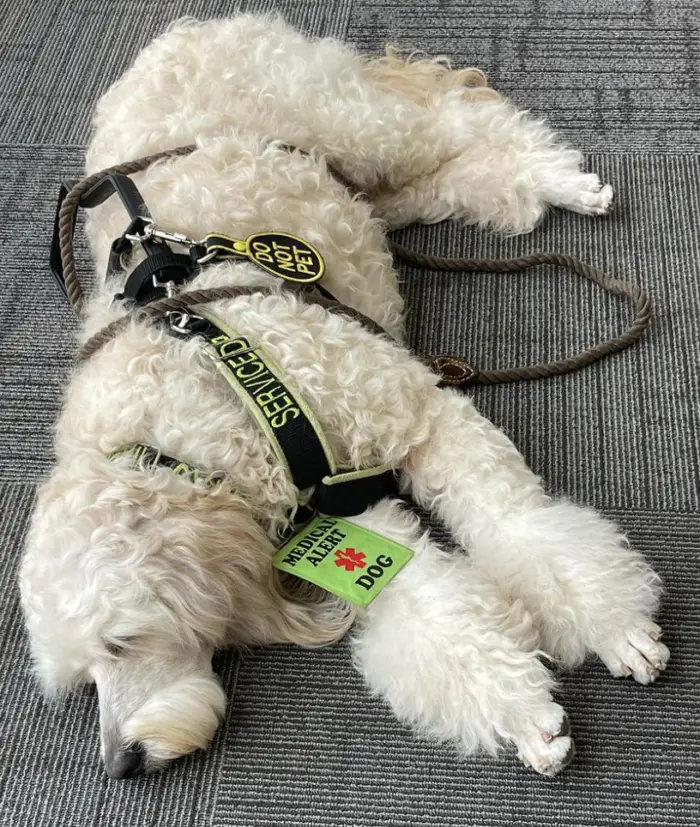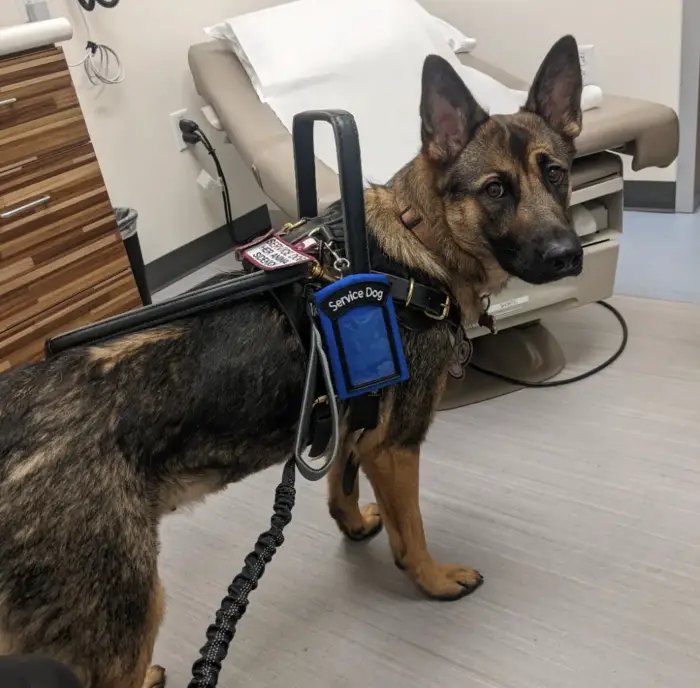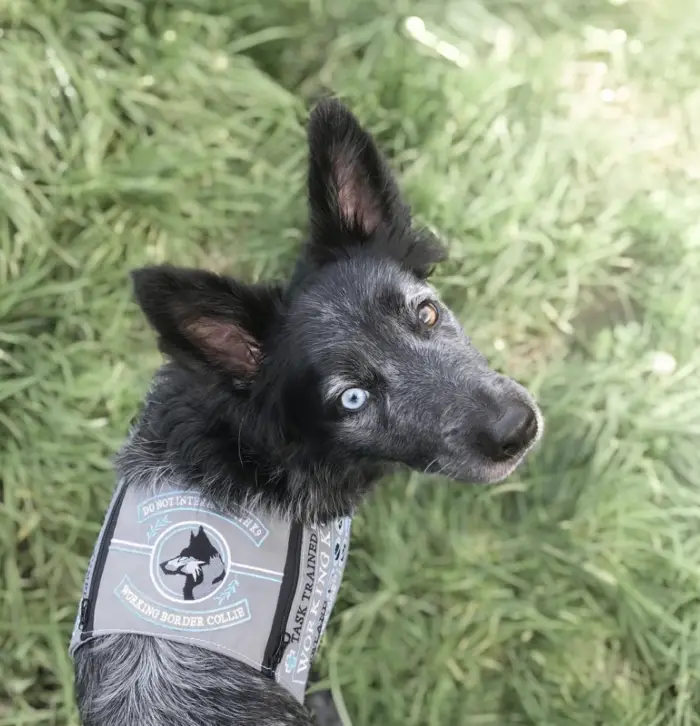Welcome to Service Dog Laws Ohio
More than 2,626,873 adults in Ohio live with some type of disability, according to the Centers for Disease Control & Prevention. These disabilities may be physical or mental impairments, psychological, developmental, or another type of disability.
Some people who have a disability live with a special type of working animal known as a service dog. Service dogs are specially trained to do “work” or “tasks” for a specific person’s disability. In this comprehensive guide, we will discuss service dog laws specific to Ohio.
There are multiple service dog laws, and things can definitely get complicated and confusing, but we’ll attempt to break them down. Let’s dive right into this, or you may use the table of contents to jump to a particular section. For a related article, check out our guide to the federal ADA service dog laws; public access laws that are the same for all U.S. States. Related article: Service animal laws by State.



Snapshot of Service Dog Laws in Ohio
Depending on the particular context (housing, employment, public access, transportation, school, etc.), there are more than a few different laws that protect a person’s rights and responsibilities for the use of service dogs in Ohio. I know this is a lot of laws. They include:
- The Americans with Disabilities Act (ADA)
- Section 504 of the Rehabilitation Act of 1973
- The Fair Housing Act
- The Individuals with Disabilities Education Improvement Act (IDEA)
- The Air Carrier Access Act of 1986
- The Ohio Revised Code
- The Ohio Administrative Code


What is a Service Dog? Multiple Definitions
The federal ADA law prohibits discrimination on the basis of disability in:
- Employment
- State and local government
- Public accommodations
- Commercial facilities
- Transportation
- Telecommunications
- United States Congress
Americans with Disabilities Act (ADA) Definition of Service Animal (Public Access Rights)
Service animal means any dog individually trained to do work or perform tasks for the benefit of an individual with a disability, including a physical, sensory, psychiatric, intellectual, or other mental disability. Other species of animals, whether wild or domestic, trained or untrained, are not service animals for purposes of this definition.
Americans with Disabilities Act

The Fair Housing Act (FHA) Definition of Assistance Animal
An assistance animal is an animal that works, provides assistance, or performs tasks for the benefit of a person with a disability, or that provides emotional support that alleviates one or more identified effects of a person’s disability. An assistance animal is not a pet.
U.S. Department of Housing & Urban Development

The Air Carrier Access Act (ACAA) Definition of Service Animal
A service animal means a dog, regardless of breed or type, that is individually trained to do work or perform tasks for the benefit of a qualified individual with a disability, including a physical, sensory, psychiatric, intellectual, or other mental disability. Animal species other than dogs, emotional support animals, comfort animals, companionship animals, and service animals in training are not service animals.
U.S. Department of Transportation

What are the rules for service dogs in Ohio?
Businesses and other public entities in Ohio must allow people with disabilities who use a service dog access to anywhere the public can go, including restaurants, grocery stores, malls, doctor’s offices, and many other places, with a few exceptions (religious organizations, sterile hospital environments such as the operating room). Service dogs are allowed in places such as schools, housing, workplaces, and for air travel; all governed by various federal and state laws. Related article: Federal ADA service dog laws, the same for all U.S. states.
Many people with disabilities require the use of a service animal throughout their daily lives. Fortunately, both federal and state laws offer protections for the use of service animals in various situations, including places of public accommodation, employment, housing, education, transportation and air travel, and state and local governments.
Disability Rights Ohio

Do service dogs need a license in Ohio?
Service dogs do not need a license or certificate in Ohio or any other state under the federal ADA or Americans with Disabilities Act. While Ohio in particular does have a government option to register an assistance animal trained by a nonprofit special agency, this is not required.
This does not mean that a service animal must be registered or trained to be protected under the ADA, but it merely exempts the owner of the animal from registration fees and annual renewal requirements applicable to other dogs.
Disability Rights Ohio

Licensing for all dogs, as dogs
If a county, state, or area requires that all dogs be licensed as a dog, then service dogs must be, too. But service dogs do not need to be licensed as service dogs in order to gain public access or any other rights. In fact, service dog registration and certifications offered online are usually a scam. Legitimate service dog licenses sold by counties or states that require licenses for all dogs are intended to provide cost savings to service dog owners and are optional.
Service animals are subject to local dog licensing and registration requirements.
Americans with Disabilities Act – Frequently Asked Questions
Ohio law requires dogs to have a valid dog license. Many dogs are found each year wearing a valid dog license, but the address or phone number in our records is outdated. In order to aid in the return of dogs to their owners, the Auditor’s office provides a found dog search feature. It is important to keep your owner information current by renewing your license, updating your owner information, or by licensing a new dog.
Franklin County, Ohio

Can you ask for service dog papers in Ohio?
Businesses and other public entities are prohibited from asking for service dog papers in Ohio, under the ADA or Americans with Disabilities Act.
Covered entities may not require documentation, such as proof that the animal has been certified, trained, or licensed as a service animal, as a condition for entry. Related article: Legitimate Registration for Service Dogs – Fact Check.
There are individuals and organizations that sell service animal certification or registration documents online. These documents do not convey any rights under the ADA and the Department of Justice does not recognize them as proof that the dog is a service animal.
Americans with Disabilities Act – Frequently Asked Questions

Does Ohio recognize emotional support animals?
Ohio does not treat emotional support animals the same as service dogs, and ESAs do not have the same public access rights or air travel rights as service dogs. ESAs may still travel through the air as a pet. In addition, emotional support animals are included in the Fair Housing Act’s definition of “assistance animal,” so ESAs can be requested as a reasonable accommodation to a housing provider’s “no pets” policy for someone with a disability. ESAs may also be requested as a workplace accommodations for someone with a disability.
To learn more about ESAs in Ohio and the laws around them, check out our article Emotional Support Animal Laws in Ohio or Emotional Support Animals – The Ultimate Guide.
An assistance animal is an animal that works, provides assistance, or performs tasks for the benefit of a person with a disability, or that provides emotional support that alleviates one or more identified effects of a person’s disability. An assistance animal is not a pet.
U.S. Department of Housing & Urban Development

Can I train my own service dog in Ohio?
Yes, you certainly can train your own service dog in Ohio. Under the federal Americans with Disabilities Act, people living with disabilities may train the dog themselves. Professional training is not required. Documents of any kind are not required for public access rights (access to public places). Related category: Service dog training and tasks.
People with disabilities have the right to train the dog themselves and are not required to use a professional service dog training program.
Americans with Disabilities Act – Frequently Asked Questions

Ohio fake service dog laws
Unfortunately, fake service dogs are a thing; basically, a pet that someone says is a service dog in order to gain access to a place that doesn’t allow pets. At this time, Ohio does not seem to have a fake service dog law. About 33 states already have fake service dog laws in place, so it’s only a matter of time before Ohio may hopefully follow. Related article: Fake service dog laws by state.

How to register or certify a service dog in Ohio
Service dog owners are not legally required to register or certify a service dog in Ohio or any other state in the U.S. Certification, registration, or any kind of documentation is not required for public access rights. Be aware of scam websites attempting to sell service dog registrations and certifications to people who don’t know better.


Service dogs are protected under the ADA, Americans with Disabilities Act, and other laws. “Registration” and “certification” seem to be a thing through illegitimate websites online. These do not convey any legal rights under the ADA or the Department of Justice. Read more about this on our blog: Legitimate Registration for Service Dogs [Fact Check].
Q17. Does the ADA require that service animals be certified as service animals?
A. No. Covered entities may not require documentation, such as proof that the animal has been certified, trained, or licensed as a service animal, as a condition for entry.
There are individuals and organizations that sell service animal certification or registration documents online. These documents do not convey any rights under the ADA and the Department of Justice does not recognize them as proof that the dog is a service animal.
Americans with Disabilities Act – Frequently Asked Questions

Service dog training Ohio
For training a service dog in Ohio, there are several options:
- Train the dog yourself
- Train the dog with the help of a dog trainer
- Apply to a professional service dog organization to provide a custom, fully trained service dog
- Work with a professional organization to help you train your own dog
- Any combination of these options may work
Psychiatric service dog Ohio
Psychiatric service dogs are a type of service dog that perform work or tasks related to psychiatric disabilities or conditions. A few examples of these types of disabilities may include:
- Eating disorders
- PTSD
- Anxiety disorders
- Depression
- TBI
Here are a few examples of some psychiatric service dog tasks:
- Providing reminders to take medication at a certain time
- Service dogs can lay across their handler and apply pressure (Read about Deep Pressure Therapy on our blog) during a panic attack, for example
- Provide tactile stimulation or grounding
- Interrupting dissociative episodes or other repetitive or problematic behaviors
- Alerting the handler to rage or other types of strong emotions
- Interrupting self-harming behaviors
- Retrieve an item, such as a water bottle and medication for a panic attack
- Wake someone up from a nightmare
- Interrupting flashbacks
- Searching the house or home to ensure it’s clear and safe before the handler enters
- Providing a “reality check” to help with hallucinations
- Stabilizing a routine for someone
- Read more on our blog: Psychiatric Service Dog Tasks – 17 Examples or What is a Psychiatric Service Dog?


Psychiatric Service Dogs vs. Emotional Support Animals
The difference between psychiatric service dogs and emotional support dogs is simple: Psychiatric service dogs are trained to do at least one task for a specific person’s disability, and the task is related to the disability.
Emotional support animals (the Ultimate Guide) are not task-trained like this and provide comfort and other benefits by their presence alone. Emotional support animals are not service dogs, but they do have some rights when it comes to housing and employment situations. Related Article: Service Animal Workplace Accommodations – ADA Laws 2023.

Are service dogs allowed in hotels in Ohio?
Indeed, hotels and other places of lodging across the U.S., including those in Ohio, are prohibited from discriminating against people with disabilities who have a service dog. Folks with service dogs must be allowed to book any room that is available to the general public, and not be restricted to pet-friendly rooms; service dogs are not pets. Extra fees, including cleaning fees, can not be charged due to the service animal unless the animal damages the room or property. Read more on our blog: Are service dogs allowed in hotels?
What Do Service Dogs Do?
Service dogs are amazing and versatile creatures. There are so many work and tasks they can do for people who are living with a disability. Remember that the task the dog completes must be directly related to a person’s specific disability. Read more on our blog: What disabilities qualify for a service dog?

Here are just a few examples (not a complete list) of work or tasks that a service dog can do:
- Helping someone who is blind or has a low vision with navigation and many other tasks
- Alerting someone who is hard of hearing or deaf to the presence of people or other important sounds
- Providing a non-violent method of protection
- Helping someone if they are having a seizure
- Pulling a wheelchair
- Possibly helping someone with severe anemia
- Letting someone know about the presence of allergens
- Retrieving items for someone, like medication or a phone
- Helping with balance issues and physical support and stability
- Helping someone with psychiatric disabilities
- Helping someone with neurological disabilities
- Interrupting impulsive or destructive tendencies and behaviors
- Read more: The Giant List of Service Dog Tasks

Public Accommodation For Service Dog Laws Ohio
In accordance with ADA laws, all private businesses and entities that serve the public must modify their policies (practices, procedures, etc.) to ensure that people with disabilities and their service dogs are accommodated.
This includes prohibitions on the presence of pets or animals. A service dog is not a pet; it is a medical assistance device that happens to have four legs and a tail.

People with disabilities must be accepted and accommodated, and permitted to be accompanied by their service animal in all public places where everyday members of the public are normally permitted (or invited, whatever you’d like to call it) to go. This includes Airbnb.

This basically covers all public places, businesses that are open to the public, and entities (with a few exceptions of course, such as certain religious places and certain hospital rooms like sterile operating rooms). Some examples include:
- Hotels
- Restaurants
- Movie theaters
- Bars
- Sports stadiums
- Retail stores
- Grocery stores
- Hospitals
- Doctor’s offices and other healthcare providers
- Gas stations
- Banks
- Laundromats
- Public transportation stations
- Museums
- Libraries
- Privates schools
- Public schools
- Other places of education
- Places of relaxation
- Places of exercise
- State & local government buildings (services, programs, and activities)
- Departments, agencies, courthouses

When can a service dog be excluded?

If the animal is out of control
There are only a few circumstances that a service dog may be excluded from a place of public accommodation, and one is if the animal is out of control and the handler does not take effective action to control the animal.
If the animal is not housebroken
The other instance is if the animal is not housebroken. In other words, if the animal “goes to the bathroom” inappropriately.
Excluding the animal doesn’t automatically exclude the person
If a service dog does get excluded for one of these reasons, it’s important to know that the business or entity must still give the person with a disability a chance to use the goods, services, and/or accommodations without their animal.
Please note that businesses are not required to take care of service animals or supervise them in any way. Read more on our blog: Can Service Dogs Go Anywhere?

What can & can’t a business ask?

Under the ADA laws, a business or entity may only ask two questions of a person with a service dog:
- Is the animal required because of a disability?
- What work or task has the animal been trained to perform?
Businesses are not permitted under ADA laws to:
- Require documentation, such as medical papers or proof that the animal has been certified, trained, or licensed as a service animal (service animals do not need to be certified or officially trained)
- Ask about someone’s disability
Charging a fee for a service dog

Charging a fee to a person with a disability just because of their service dog is not allowed under the ADA (Americans with Disabilities Act).
This is still true for a public place that ordinarily charges a fee for other people who are accompanied by pets. Service dogs are not pets.
Businesses may charge for damages only
If a business normally charges for damages that are caused by a pet or animal, then a person with a disability may also be charged the same fees if their service dog causes any damage.
Responsibilities of service dog handlers

Service dog handlers – the people who use service dogs – have to follow a few rules as well.
- The handler must maintain control of the animal
- The animal must have a harness, leash, or another tether
- If a harness, leash, or other tether isn’t possible, then voice control or signals must be used to effectively control the animal
Ohio laws on service dogs in training
Under the federal Americans with Disabilities Act laws, a service dog must already be trained before being allowed into public places. However, some states do allow service dogs in training public access rights. Good news, service dogs in training are covered by Ohio State law.
When either a blind, deaf or hearing impaired, or mobility impaired person or a trainer of an assistance dog is accompanied by an assistance dog, the person or the trainer, as applicable, is entitled to the full and equal accommodations, advantages, facilities, and privileges . . .
Table of State Laws
Ohio State service dog laws

Ohio State laws vs. Federal laws
You may already be aware that more than one set of laws exist for service dogs. The State of Ohio has a few things written in its laws that are new or different from the federal laws.
It’s interesting also that, where more than one law is available for a certain place, someone with a disability may use whichever law benefits them.

Summary of Ohio State-specific service dog laws
Places of public accommodation are prohibited from discriminating against people with disabilities, including denying access or charging a fee because of the service dog or “animal assistant” as Ohio calls it.
Service dog vs. service “animal”
Ohio Administrative Code 4112-5-02 defines an “animal assistant” as any animal that aids a person with a disability. This might be a dog. But it might also be a monkey, for example, which can help a person with a mobility impairment by retrieving or collecting items. Check out: Envision Access (Helping Hands Service Monkies).

Individual needs vary, and people are protected under Ohio state law in places of public accommodation. If a person with a disability needs a slightly unconventional type of animal for their needs, that is okay, and businesses need to respect it.

Rights of service dog trainers

Service dog trainers in Ohio are entitled to the same rights as service dogs while they are training. Charges are not allowed. Service dogs-in-training must be covered by a liability insurance policy. This should be provided by the nonprofit special agency that is training the dog.
Service dogs & housing

The Fair Housing Act protects people with disabilities from discrimination in housing situations. People with disabilities must not be discriminated against in terms, conditions, or privileges of a housing situation.
An example of discrimination would be a landlord refusing to make reasonable accommodations in their rules or policies, practices, or services in order to provide an equal opportunity to a person with a disability.

If a tenant with a disability needs a service animal, then a landlord is generally obligated under the law to grant permission. This is true even when pets are restricted or prohibited in the dwelling. Service animals are not pets.
The Fair Housing Act protects people and it applies to virtually all and any forms of housing.
If you need a service dog as a tenant

If you are a tenant with a disability and need the use of a service dog in a rented dwelling, the Fair Housing Act protects you.
What you need to do:
Notify the landlord in writing
You should notify your landlord or potential landlord in writing. This should mention that you do have a disability. You don’t need to share any details about your disability. State that you need a service animal to afford you an equal opportunity to use and enjoy the dwelling.
Request a modification
Request a modification in the landlord’s policies that may prohibit pets or animals. This is a “reasonable accommodation” request. See your doctor, mental health professional, or another medical professional to obtain a letter. This letter can simply state your official need for the animal. Including medical history or information is not necessary.
The landlord only needs to be able to determine that the modifications are necessary because of a disability. Requiring a tenant to pay a fee or a deposit for a service animal is illegal. However, it’s important to note that a tenant can be charged for the cost of repairing damages if they are caused by the service dog.

When a landlord can refuse a service dog
There are only a few circumstances where a landlord or property manager can refuse to allow a service dog to occupy a dwelling with a person who has a disability.
These are:
- If the request for rental accommodation would cause undue burden, either financially or administratively
- If fundamental alterations to the nature of the housing would be required
- If a service animal is being disruptive to other tenants
- If the service animal is a direct threat to the health, safety, and/or property of other people
Fair Housing Act & other animals

The Fair Housing Act includes definitions and protections that are much broader than the ones found in the ADA, which handles public accommodations. For housing situations, a service animal doesn’t necessarily need to be a dog. And, a service animal does not need to be trained or certified.
For example, a “service monkey” is a legitimate thing, and can help someone who has mobility issues to retrieve items and other tasks. Emotional support animals can be considered in a housing situation as a reasonable accommodation. Emotional support dogs/animals are particularly helpful for people living with depression, anxiety, or PTSD (post-traumatic stress disorder). Read more on our blog: Emotional Support Animals – The Ultimate Guide.
Service animals in the workplace

The service dog laws Ohio, under the ADA, allow people with disabilities to have their service dogs go to work with them. Employers are not to refuse to allow reasonable accommodations to people with disabilities.
Reasonable accommodations are changes to a work environment, policies, or practices of an employer. These have the ability to enable a qualified employee who lives with a disability to perform essential functions or tasks or to apply for employment.
Service animals in the workplace setting are not limited only to dogs. It’s possible that a reasonable accommodation may even include emotional support animals in certain circumstances.
An employee – not an employer – is responsible for the care and monitoring of their service animal. Having said that, the employer may need to provide the employee with some flexibility. For example, being able to take the animal outside for bodily functions. Read more on our blog: ADA Workplace Accommodation Laws Summary & FAQ
Notifying employers about service dogs needed in the workplace

Request for accommodation
Service dog laws in Ohio indicate that employers must be notified if you have a disability and need a service animal as a reasonable accommodation to enable or aid employment. You could notify an employer verbally, or in writing. Writing is preferable for several reasons, one of which is in case you need a “paper trail” later.
When the disability is invisible
Some disabilities are obvious and some are completely invisible. When disabilities are invisible, an employer may request more information about a disability. In addition, the employer may need to understand the relationship between the disability and the service dog. In other words, how will the dog help an employee to do their job?
Having the support of your doctor or another health professional can help, and can help demonstrate that the need for the dog or animal is real. This can be accomplished orally or in writing, although in writing is preferable.
Unless the disability is obvious, the employer could require additional information about the employee’s disability as well as the relationship between the employee’s disability and his or her need for a service animal to be able to perform the job duties. It is important to have the support of the person’s doctor or another medical professional to demonstrate the necessity of a service animal.
Limits on service animals in the workplace


There are a few limitations to having service dogs in the workplace. An employer can refuse a request for accommodation if it is not reasonable. Or, if it would cause undue hardship on business operations. In addition, an employer may choose to provide an equally effective, but alternative, reasonable accommodation, other than the one requested (the animal) by the employee.
Employees may need to demonstrate that the service animal is the only effective accommodation available to them and their unique circumstances.
Service dogs in schools

Students with disabilities who need service dogs in schools and other educational settings are protected by federal law. This includes:
- Nursery school
- Elementary school
- Secondary school
- Undergraduate school
- Postgraduate School
- Private school
- Another place of education

Some examples of what a service dog might do to help a student in an educational environment include:
- Service dogs can help with social phobias and separation anxiety disorder; a service dog can act as a transitional support so people living with these circumstances may be able to leave home and go to school
- A service dog may alert a person who is living with diabetes that their blood sugar levels are becoming too high or low
- A service dog may help someone living with cerebral palsy by assisting to open and close doors, pick up objects, and can help in many other ways in the education environment
Section 504 of the Rehabilitation Act of 1973 service dog laws in Ohio prohibits disability discrimination in schools.
Transportation with service dogs in Ohio


People with service dogs have a right to bring their animals into transportation settings. This includes taxis and buses, and many other modes of transportation. Businesses and entities must allow people with disabilities who are using a service dog equal access to transportation in vehicles and facilities.
Ohio law states that a “public conveyance by air, land, or water” cannot deny a person with a disability because of their service dog. Nor can they charge an extra fee because of the service animal. An animal assistant is any animal that aids a person with a disability. Service dogs-in-training have the same rights as per Ohio state law.

Some guidelines for service dogs in transportation:
- The dog may not occupy a seat
- The dog must be leashed while using the facilities
- Any dog in training to become an assistance dog must be covered by a liability insurance policy. It must be provided by the nonprofit special agency that is training the dog
Air travel

As per the ACAA (Air Carrier Access Act), commercial airlines need to allow a service animal to accompany a passenger with a disability. This is true even if the dog may offend or annoy other people on the airplane.
The service dog must be allowed to accompany a passenger in any seat where the passenger sits unless the animal is blocking an aisle or another area that needs to remain clear in case of emergencies. Read more on our blog: American Airlines Service Dog Info – The Easy Guide
Documentation required for air travel

Service animal documentation for air travel is often needed, even though it is not permitted in a general public-access setting. There are a variety of ways to present evidence or supporting documentation about a service animal to an airline.
One method is to show an identification card, or another written document, possibly from your doctor or medical professional. Another method is the credible verbal assurances of a qualified person who is using the service dog.
When flights are 8 hours or more, a commercial airline may request documentation that indicates the animal can relieve itself in a sanitary way that will not cause an issue on the flight.
If a passenger is seeking to travel with another type of working dog, such as an emotional support dog or psychiatric service dog, an airline may request documentation from a doctor or mental health professional, written on official letterhead. This could be from a licensed mental health professional, social worker, medical doctor, psychiatrist, psychologist, or another doctor.
This documentation should state:
- The passenger has an emotional or mental type of disability that has been recognized in the Diagnostic and Statistical Manual of Mental Disorders – Fourth Edition;
- The passenger needs the emotional support or psychiatric animal as an accommodation for air travel or for activity at the passenger’s destination
- The individual providing the assessment is a licensed mental health professional and the passenger is under his or her professional care
- The date and type of the mental health professional’s license and the state or other jurisdiction in which it was issued
Disability Rights Ohio
50 W. Broad St., Suite 1400
Columbus, Ohio 43215-5923
FAX 614-644-1888
TTY 614-728-2553 or 800-858-3542
Related Articles:
- ADA Service Dog Workplace Accommodation Laws
- ADA Service Dog Laws – General Guide & FAQ
- Emotional Support Animal Laws Ohio
- Disability Rights Ohio

Sam is an experienced writer, advocate for people with disabilities and mental health, dog lover, artist, philosopher, and generally complicated human being.
